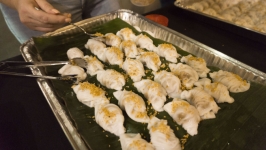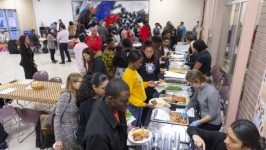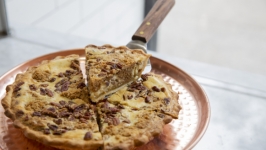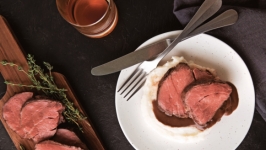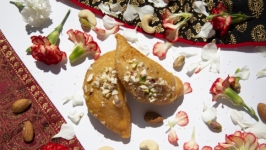Elmhurst’s Songkran Festival Celebrates the Thai New Year
It is difficult to overemphasize how stunningly diverse Central Queens has become over the past several decades. Perhaps in no neighborhood is this more evident than Elmhurst, a former colonial village that is now home to thousands of immigrants from Southeast Asia and Latin America. Over the past decade, the neighborhood has become the epicenter of Thai culture in New York, growing immensely in the three years since the Asian American Federation reported of the neighborhood only 843 Thai immigrants in Elmhurst.
On a two-block stretch of Woodside Avenue during the last weeks of April, the community gathered to celebrate its heritage. Songkran, the Southeast Asian water festival that commemorates Buddhist New Year, is officially celebrated on April 13 in Thailand, but festivals continue for weeks. Here is a taste of Elmhurst’s 2017 Songkran Festival.
A post shared by Edible Queens (@ediblequeens) on Apr 29, 2017 at 1:06pm PDT
Early in the afternoon on the final day of the festivities, colorful flags were strung between rows of tiny white tents. Vendors from Elmhurst’s 30-plus Thai restaurants and markets proudly displayed their wares, hoping to attract the eye (or nose) of a passing festivalgoer. Clusters of lawn chairs and ceremonial rugs sprawled across the sidewalk and onto the curb. As I arrived, city council member Daniel Dromm delivered remarks from atop a makeshift stage alongside representatives from the Royal Thai Consulate.
The vendors were selling a dizzying variety of Thai snacks and desserts, ranging from the requisite mango and sticky rice to the mofongo-like kluay kha, a fried croquette of mashed taro and plantain drizzled with sticky tamarind. The white tents represented the food and culture of Elmhurst, but also its community, with vendors like Sugar Club, a grocery store and dessert bar that doubles as a community center and internet café for new Thai immigrants.
A post shared by Edible Queens (@ediblequeens) on Apr 29, 2017 at 1:19pm PDT
Judging by the length of the line, the most anticipated vendor was an open-air kitchen run by one of the neighborhood’s most beloved brick-and-mortar restaurants. Khao Kang, which literally translates to “rice and curry,” typically serves what its name indicates: various curries, ranging from fiery to funky, generously doled out over fragrant rice. On Saturday, however, the cooks opted for morsels better suited for on-the-go eating. Golden khai jiao, the Thai analog to an omelette stuffed with coconut shrimp and bean sprouts, and skewers of grilled chicken leg are the main attractions.
While waiting on line, I spoke with Kohsoom Kadesadayurat, a middle-aged woman who moved to Queens in 2003 from Bangkok.
“I like it here,” she mused. “I live off of Broadway. That area is very accessible for Thai people. We have the temple, our own restaurants, groceries, salons. You cannot find this anywhere else in the city, and it is still affordable to live and start a business here. That’s why I decided to raise my son here. I’m happy he got to grow up around both cultures.”
A post shared by Edible Queens (@ediblequeens) on Apr 29, 2017 at 1:24pm PDT
The attendees of the festival reflected the diversity of the surrounding neighborhood. Two festivalgoers, Josh Baker and Claudia Garcia, grew up on the same block in Elmhurst and have remained friends in spite of both moving out of the neighborhood.
“I never really tried any of these [foods] until I was older even though I grew up around it,” said Baker. “My parents used to tell me that street food would make me sick. I’m not sick yet and I’ve been eating it for ten years now.”
Garcia’s experience was slightly different. “My dad is from Mexico and my mom is Venezuelan,” she told me. “I grew up eating spicy food, mangos, lots of chili and lime and onion. It’s not all that different from what’s being served here.”
A post shared by Edible Queens (@ediblequeens) on Apr 30, 2017 at 7:10am PDT
As the festivities came to a close, I sipped a sugar cane juice as vendors began to pack up their stalls one-by-one. As the sun set, a band of middle-aged men played a set of Thai songs interspersed with the occasional Tom Petty or Michael Jackson cover. The flavors and outfits here may have been distinctly Thai, but the satisfaction of spending a day gorging on street food and chatting with neighbors in the warmth of a springtime sun is universal to street festivals everywhere.


